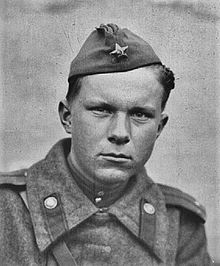Vasil Bykaŭ
Belarusian writer (1924–2003)
Vasíl Uładzímiravič Býkaŭ (often spelled Vasil Bykov, Belarusian: Васі́ль Уладзі́міравіч Бы́каў, (June 19, 1924 – June 22, 2003) was a prolific author of novels and novellas about World War II and a significant figure in Belarusian literature and civic thought. His work earned him endorsements for the Nobel Prize nomination from, among others, Nobel Prize laureates Joseph Brodsky and Czesław Miłosz.

Quotes
edit- Suffering makes us human. A person without suffering is just grass.
- Васіль Быкаў. Трэцяя ракета // rv-blr.com (in Belarusian)
- The nationalism of a great nation inevitably degenerates into chauvinism and imperialism. The nationalism of a small nation is aimed primarily at the survival of the nation among others.
- Правілы жыцця Васіля Быкава // belsat.eu (in Belarusian)
- In a society where every third person is a communist and every second person is an informer, it is difficult to expect to win by democratic means.
- about Belarusian society
- Вялікія словы на вялікай мове // dumki.org (in Belarusian)
- Today he (Lukashenka) won by the hands of "gorillas" in black masks. Already it is clear that there will be no Parliament in Belarus, no democratic election. The remains of a free press will disappear. A presidential Junta will govern the country... Well, we can congratulate Belarusians on the previous elections. Worse cannot be done. For ourselves, for society and for future generations.
- about results of Belarusian presidential election, 1994
- “Ён Прыехаў, Сам Памёр, Усё Спакойна…” Апошнія Тыдні Васіля Быкава // svaboda.org
(in Belarusian)
- The Communist-Fascists, who are managers of the press, remove unwanted editors and monopolize the printing base, as it is widely practiced today in Belarus.
- “Ён Прыехаў, Сам Памёр, Усё Спакойна…” Апошнія Тыдні Васіля Быкава // svaboda.org
(in Belarusian)
- “Ён Прыехаў, Сам Памёр, Усё Спакойна…” Апошнія Тыдні Васіля Быкава // svaboda.org
- The signing of the Union Treaty is not just sad. This is the crime of the century. This, of course, is the genocide of the Belarusian nation. This is the end of Belarusian history.
- “Ён Прыехаў, Сам Памёр, Усё Спакойна…” Апошнія Тыдні Васіля Быкава // svaboda.org
(in Belarusian)
- “Ён Прыехаў, Сам Памёр, Усё Спакойна…” Апошнія Тыдні Васіля Быкава // svaboda.org
- The pro-imperial dictatorship of Lukashenka keeps the direction of unification with Russia, destroying the national culture and the Belarusian language.
- “Ён Прыехаў, Сам Памёр, Усё Спакойна…” Апошнія Тыдні Васіля Быкава // svaboda.org
(in Belarusian)
- “Ён Прыехаў, Сам Памёр, Усё Спакойна…” Апошнія Тыдні Васіля Быкава // svaboda.org
- I cannot write in Minsk. Firstly, I have a cold apartment. I will die there with my sick lungs soon. Because the presidential decree introduced the maximum temperature in Minsk... He [Lukashenka] does not need Bykau. He has a close-knit and strong cohort of own writers, who write his biographies. They write about him, describe his life. And it's enough for Lukashenka. He does not perceive anything else. The things that Lukashenko is doing are aimed at the complete elimination of the sovereignty of Belarus. He completely enslaves the people.
- “Ён Прыехаў, Сам Памёр, Усё Спакойна…” Апошнія Тыдні Васіля Быкава // svaboda.org
(in Belarusian)
- “Ён Прыехаў, Сам Памёр, Усё Спакойна…” Апошнія Тыдні Васіля Быкава // svaboda.org
- Publishers have no tight to saturate the book market with works which have no demand, which do not get sold. It would be unnatural, both economically and also, probably, morally.
- 'Trava posle nas', Ogonek, 19 (1987). A. Brown, ed (2004). The Demise of Marxism-Leninism in Russia. Springer. p. 100. ISBN 9780230554405.
- After making public the gruesome discoveries made at the wasteland near Minsk, dozens of reports appeared in the press about similar mass graves uncovered in all regional centres of the Republic and many lesser towns. Who lies in these graves, who were the people shot in all those years, and - most importantly - who were the murderers? We have no answer yet to these questions, and one gets an impression that there are powerful forces not interested at all in such answers ever being given.
- 'Zhazhda peremen' ['Thirst for Change'], Pravda, 24 November 1989, p.4. Source: Zygmunt Bauman (2013). Modernity and Ambivalence. John Wiley & Sons. p. 68. ISBN 9780745638119.
- Bureaucracy and culture are incompatible. Bureaucracy needs power, and culture is not wanted by it.
- 1989. Source: Vladimir Shlapentokh (2014). Soviet Intellectuals and Political Power: The Post-Stalin Era. Princeton University Press. p. 22. ISBN 9781400861132.
Quotes about Vasil Bykaŭ
edit- Bykov's prose reminds one of a tightly compressed steel spring that, swiftly uncoiling and straightening itself out, carries such a charge of inexhaustible energy that one feels he has lived his whole life together with his heroes.
- Aĭtmatov, Chingiz (1985). Do the Russians Want War?: Collection. Progress Publishers. p. 69.
- Vasil Bykov is a very courageous and uncompromising writer, rather of the Solzhenitsyn stamp.
- Michael Glenny (1972) Partisan Review, .